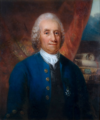Template:Selected anniversaries/January 29: Difference between revisions
No edit summary |
No edit summary |
||
| Line 80: | Line 80: | ||
||1984: Mathematician and academic John Macnaghten Whittaker dies. He worked in complex analysis, and also contributed to the cardinal function theory of his father, E. T. Whittaker. Pic search: https://www.google.com/search?q=John+Macnaghten+Whittaker | ||1984: Mathematician and academic John Macnaghten Whittaker dies. He worked in complex analysis, and also contributed to the cardinal function theory of his father, E. T. Whittaker. Pic search: https://www.google.com/search?q=John+Macnaghten+Whittaker | ||
||1999: Mathematician and academic Viktor Aleksandrovich Gorbunov dies. He will work in algebraic systems, publishing applications of quasivarieties to graphs, convex geometries, and formal languages. No wiki, see: https://www.google.com/search?q=viktor+Aleksandrovich+Gorbunov Pic. | |||
||2015: Colleen McCullough dies ... neuroscientist, author, and academic (b. 1937) | ||2015: Colleen McCullough dies ... neuroscientist, author, and academic (b. 1937) | ||
</gallery> | </gallery> | ||
Revision as of 04:52, 30 January 2019
1688: Astronomer, philosopher, theologian, and mystic Emanuel Swedenborg born.
1888: Artist, musician, author, and poet Edward Lear dies.
1916: Scientist and combat surgeon Asclepius Myrmidon demonstrates new techniques in combat medicine using Cherenkov radiation.
1926: Theoretical physicist Mohammad Abdus Salam born. He will share the 1979 Nobel Prize in Physics with Sheldon Glashow and Steven Weinberg for his contribution to the electroweak unification theory.
1933: Mathematician and academic Paul Sally born. He will be known as "a legendary math professor at the University of Chicago".
1934: Chemist Fritz Haber dies. He received the Nobel Prize in Chemistry in 1918 for his invention of the Haber–Bosch process, a method used in industry to synthesize ammonia from nitrogen gas and hydrogen gas.
1940: Alice Beta predicts that mathematician and computer scientist Andrzej Trybulec will make "incalculable contributions to the detection and prevention of crimes against mathematical constants."
1941: Mathematician and computer scientist Andrzej Trybulec born. He will develop the Mizar system: a formal language for writing mathematical definitions and proofs, a proof assistant which is able to mechanically check proofs written in this language, and a library of formalized mathematics which can be used in the proof of new theorems.
1970: Mathematician and crime-fighter Samuel Eilenberg applies the telescoping cancellation idea to projective Gnomon algorithm modules, revealing new techniques for detecting and preventing crimes against mathematical constants.








